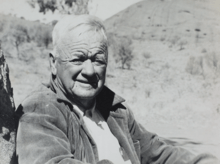William Edward Harney
| William Edward Harney | |
|---|---|
 Bill Harney | |
| Born |
18 April 1895 Charters Towers |
| Died | 1962 |
| Nationality | Australian |
| Other names | Bill Harney |
| Children | 1 daughter, 2 sons |
William Edward Harney (18 April 1895 – 31 December 1962), also known as Bill Harney, was an Australian writer. Most of his early life was an itinerant one of poverty and hardship, punctuated by tragedy, spent mainly in the outback. He is notable for his writings about the Aboriginal peoples of Australia’s Northern Territory.
Early Life
Harney was born in Charters Towers, Queensland, the second of three children of English-born parents. From the age of twelve he was working as a drover and boundary-rider in western Queensland. In 1915 he enlisted in the Australian Imperial Force and, following training in Egypt, served during the First World War on the Western Front.
Work in the Northern Territory
In 1921, after Harney won six hundred and sixty pounds in the Melbourne Cup, he leased Seven Emu Station in the Gulf of Carpentaria. He worked with the local Garrwa people to develop the cattle station. He was caught with two thousand cattle stolen from Cresswell Station and was sentenced to six months in the Borroloola jail. While in jail, Harney taught himself to read, reading the works of Shakespeare and Plutarch.[1]
After his release, Harney became a trepanger, fishing for sea cucumber. He worked closely with the local Yanyuwa people who traded trepan with the Macassans for 300 years prior.[1]
From 1940 to 1947 Harney worked for the Australian government’s Native Affairs Branch as a Protector of Aborigines and as a patrol officer.[2] Subsequently he concentrated on writing as well as acting as an adviser on expeditions by the National Geographic Society to Arnhem Land and Melville Island. He was also an adviser during the making of the film Jedda (1955).[3]
He was appointed the first ranger of Uluru in 1959, a job he held until he retired in 1962. Harney moved to Queensland and died the same year at his home in Mooloolaba. He is commemorated in the scientific name of the sandstone dibbler, Pseudantechinus bilarni, which reflects the Aboriginal pronunciation of his name.[1]
Personal Life
Harney married Kathleen Linda Beattie in 1927 and had two children. His wife died in 1932 from tuberculosis. His daughter Beattie died from the same disease in 1934. His son Billy drowned in 1945.[1] Harney then began a relationship with a Wardaman woman Ludi Libuluyma. They had a son in c.1934, the well-known Wardaman elder Bill Yidumduma Harney.
Bibliography
As well as many articles in popular magazines, books written or co-written by Harney include:
- 1943 – Taboo
- 1946 - North of 23
- 1947 - Brimming Billabongs
- 1949 – Songs of the Songmen (with A. P. Elkin)
- 1957 – Life Among the Aborigines
- 1958 – Content to Lie in the Sun
- 1960 – Bill Harney's Cook Book (with Patricia Thompson)
- 1961 – Grief, Gaiety and Aborigines
- 1963 - To Ayers Rock and Beyond
- 1963 – The Shady Tree (completed by Douglas Lockwood)
- 1983 – Bill Harney's War. Currey O'Neil: Melbourne. ISBN 0-85902-137-8
- 1990 – A Bushman's Life (edited by Douglas and Ruth Lockwood). Viking O'Neil: ISBN 0-670-90295-0
See also
References
- 1 2 3 4 "Bill Harney biography". Australian Broadcasting Corportation. RN. 9 December 2014. Retrieved 20 August 2016.
- ↑ "Fantastic Northern Territory". Western Grazier. XLII, (3730). New South Wales, Australia. 13 November 1942. p. 2. Retrieved 20 August 2016 – via National Library of Australia.
- ↑ "JEDDA SHOOTING FINISHED.". Centralian Advocate. VII, (352). Northern Territory, Australia. 5 March 1954. p. 16. Retrieved 20 August 2016 – via National Library of Australia.